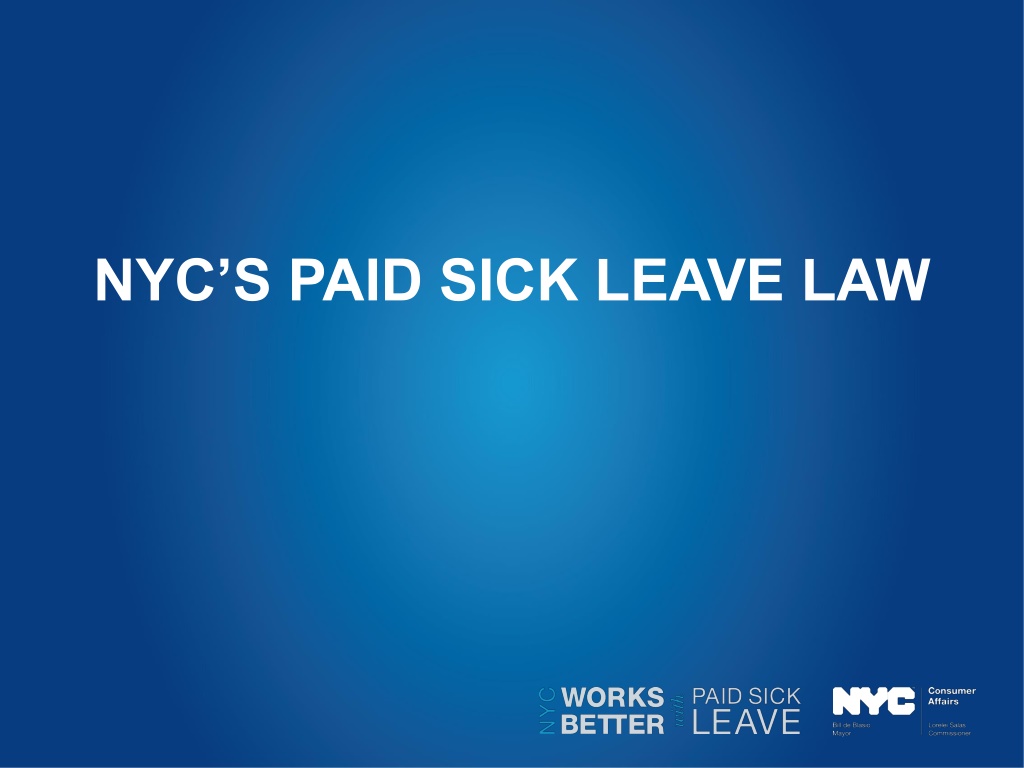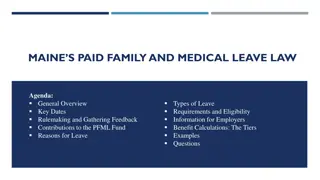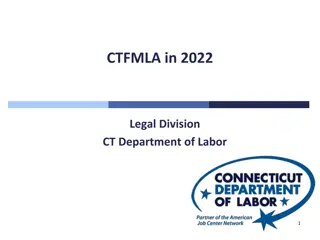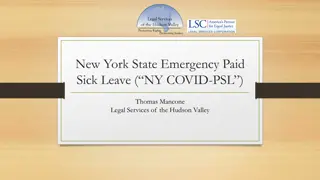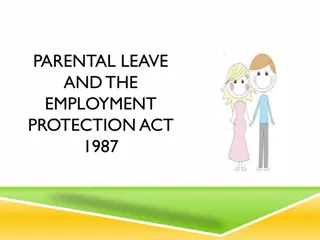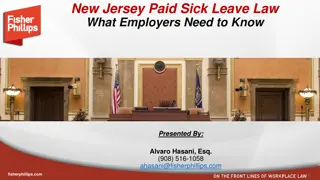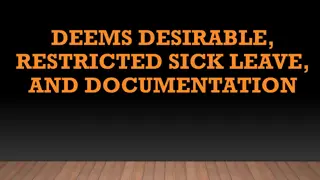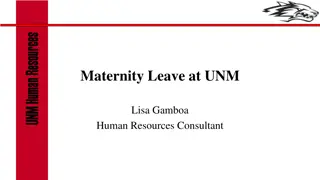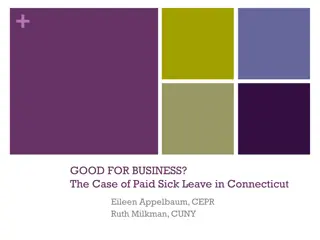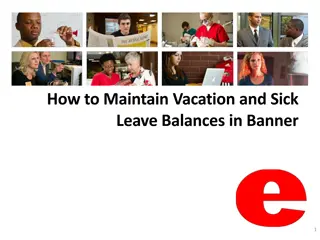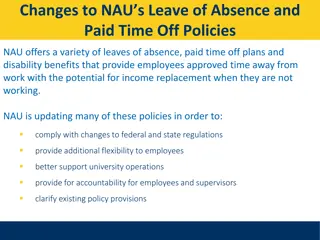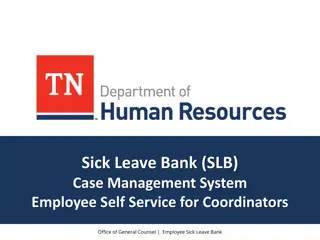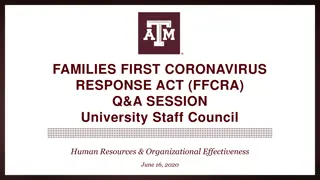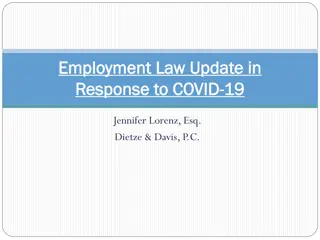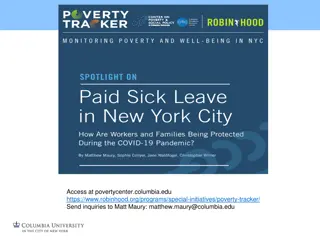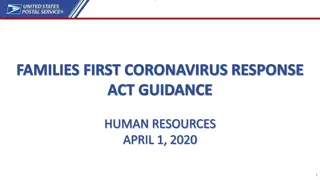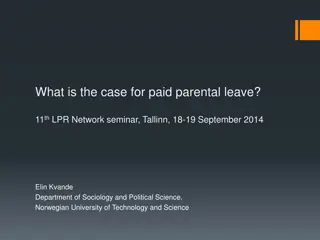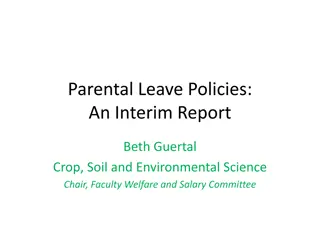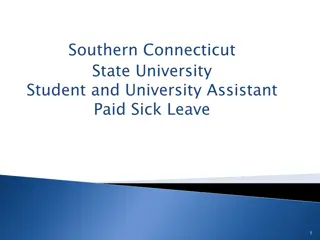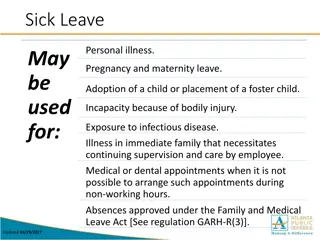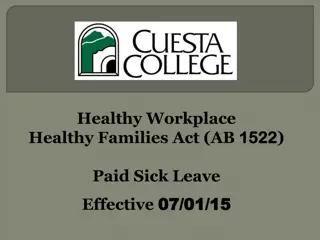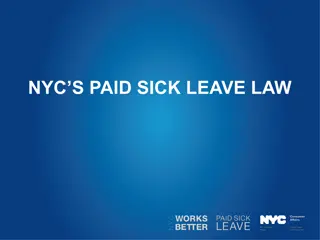Understanding NYC Paid Sick Leave Law
NYC Paid Sick Leave Law ensures employees have access to sick leave for themselves or family members. Employers must provide paid or unpaid sick leave based on the number of employees. The law covers various family members, including children, grandparents, and siblings. The Department of Consumer Affairs oversees implementation and enforcement. Employees can avail of sick leave for various purposes, promoting better health and business productivity.
Download Presentation

Please find below an Image/Link to download the presentation.
The content on the website is provided AS IS for your information and personal use only. It may not be sold, licensed, or shared on other websites without obtaining consent from the author. Download presentation by click this link. If you encounter any issues during the download, it is possible that the publisher has removed the file from their server.
E N D
Presentation Transcript
The benefits of paid sick leave extend far beyond the positive impact on individual families. It's also about making our businesses run better, and protecting the health and welfare of their customers. - Mayor Bill de Blasio
WHAT WE WILL COVER Brief introduction What does the law provide? Who is covered under the law? Notice of Employee Rights How does sick leave accrue? For what purposes can employees use sick leave? Compliance Q & A
BRIEF INTRODUCTION NYC was the 7th jurisdiction to guarantee access to sick leave for employees under the Earned Sick Time Act (Paid Sick Leave Law). To date, 13 additional jurisdictions have adopted paid sick leave laws. More than 1 million NYC employees will now have the right to sick leave.
BRIEF INTRODUCTION The Department of Consumer Affairs (DCA) oversees implementation and enforcement of the Earned Sick Time Act (Paid Sick Leave Law). Employers and employees can get the required Notice of Employee Rights, one-page overviews, FAQs, and training event schedule in the following ways: Visit our offices at 42 Broadway, 11th Floor, New York, NY 10004 Visit nyc.gov/PaidSickLeave Call 311
WHAT DOES THE LAW PROVIDE? Under the law, covered employees have the right to use sick leave for the care and treatment of themselves or a family member. The law recognizes the following as a family member: Child (biological, adopted, or foster child; legal ward; child of an employee standing in loco parentis) Grandchild Spouse Domestic Partner Parent Grandparent Child or parent of an employee s spouse or domestic partner Sibling (including a half, adopted, or step sibling)
WHAT DOES THE LAW PROVIDE? KEY FACTS: EMPLOYEES All employers must provide some type of sick leave. Employers with 5 or more employees or 1 or more domestic workers must provide paid sick leave. Employers with fewer than 5 employees must provide unpaid sick leave.
WHAT DOES THE LAW PROVIDE? KEY FACTS: DOMESTIC WORKERS An employer with 1 or more domestic workers who have worked for the employer for at least 1 year must provide 2 days of paid sick leave. Domestic worker(s) must work more than 80 hours per calendar year. Definition: person employed in a home or residence for the purpose of caring for a child, serving as a companion for a sick, convalescing or elderly person, housekeeping, or for any other domestic service purpose. NYS Labor Law City leave is in addition to the 3 days of paid rest guaranteed under NYS Labor Law.
WHO IS COVERED UNDER THE LAW? The law covers: Full-time employees Part-time employees Temporary employees Per diem and on call employees Transitional jobs program employees Undocumented employees Employees who are family members but not owners Employees who live outside of NYC but work in NYC
WHO IS NOT COVERED UNDER THE LAW? The law does not cover: Employees who work 80 hours or less a calendar year in NYC Employees of government agencies Independent contractors Students in federal work study programs Employees whose work is compensated by qualified scholarship programs Participants in Work Experience Programs (WEP)
PRE-EXISTING UNION CONTRACTS The law does not apply to employees subject to a collective bargaining agreement that has been in effect since April 1, 2014. For all other agreements, the agreement must expressly waive the law s provisions and, unless the employee is in the grocery or construction industry, the agreement must provide comparable benefit.
NOTICE OF EMPLOYEE RIGHTS Employers must give covered employees the Notice of Employee Rights created by DCA on the first day of their employment. The Notice is available in English and 25 additional languages at nyc.gov/PaidSickLeave.
NOTICE OF EMPLOYEE RIGHTS Employers are required to keep records that show the date the Notice was provided to each employee and proof that the Notice was received by each employee. Employers can give employees the Notice in person, by regular mail, or by email. Save email receipts.
NOTICE OF EMPLOYEE RIGHTS Includes: Accrual rate and information on how to use sick leave. Employer s calendar year. Right to be free from retaliation. Right to file a complaint.
HOW DOES SICK LEAVE ACCRUE? An employee earns 1 hour of sick leave for every 30 hours worked. An employee can accrue up to 40 hours of sick leave per calendar year. A calendar year is a consecutive 12-month period of time determined by employer.
SICK LEAVE TIMEKEEPING TOOLS To help employers keep track of sick leave accrual and use for employees, DCA developed Timekeeping Tools. Tools are available to use at nyc.gov/PaidSickLeave Use the tool that corresponds to how you keep track of hours worked: Daily, Weekly, or Biweekly. Instructions are included with each tool.
WHAT HAPPENS TO UNUSED SICK LEAVE? Employees can carry over up to 40 hours of unused sick leave to the next calendar year. Employees continue to accrue up to 40 hours of sick leave in addition to the sick leave carried over from the previous year. Employers are only required to allow employees to use up to 40 hours of sick leave per calendar year.
RATE OF PAID SICK LEAVE Employers with 5 or more employees pay employees at their regular hourly rate but no less than the minimum wage. This includes employees whose salary is based on tips or gratuity.
FOR WHAT PURPOSES CAN EMPLOYEES USE SICK LEAVE? Employees can use leave for themselves or a family member for: Mental or physical illness, injury, or health condition. Medical diagnosis, care, or treatment of above. Preventive medical care. Business closes due to a public health emergency. Care of child whose school or child care provider closed due to a public health emergency.
FOR WHAT PURPOSES CAN EMPLOYEES USE SICK LEAVE? Employers can require documentation from a licensed health care provider if employee uses more than 3 consecutive workdays as sick leave. Employers cannot require provider to specify the medical reason for sick leave. Note: A workday does not need to be a full day if the employee works part time. Employers may require employee to provide written verification that employee used sick leave for sick leave purposes. Form located at nyc.gov/PaidSickLeave Employers must include these requirements in their written policy.
FOR WHAT PURPOSES CAN EMPLOYEES USE SICK LEAVE? If the need is foreseeable, employers can require up to 7 days advance notice before employee uses sick leave. Example: scheduled doctor s appointment If the need is unforeseeable, employer may require employee to give notice as soon as practicable (reasonable). Example: accident The employer s requirements for giving notice of the need to use sick leave must be included in a written sick leave policy.
FOR WHAT PURPOSES CAN EMPLOYEES USE SICK LEAVE? An employer can set reasonable minimum increments for the use of sick leave, but the minimum cannot be more than 4 hours per day unless otherwise permitted by state or federal law. The employer s minimum increment must be included in a written sick leave policy. An employer may set fixed periods of 30 minutes or less for the use of time beyond the minimum daily increment.
OTHER LEAVE POLICIES The Paid Sick Leave Law sets the minimumrequirements for sick leave. An employer s existing leave policies may already meet or exceed the requirements of the law. Example: If employer gives employees at least 40 hours of paid leave that employees can use for sick leave under the same conditions as the City s Paid Sick Leave Law, the employer does not have to give additional time off.
COMPLIANCE DCA continues to coordinate an extensive public education and outreach campaign to help employers and employees understand their responsibilities and rights. Employers must keep and maintain records documenting compliance with the law for at least 3 years. Employers must keep any health-related information confidential.
COMPLIANCE Employers must maintain records that show: Each employee s name, address, phone number, dates of employment, pay rate, whether employee is exempt from overtime. Hours worked by each employee. Date and time of each instance of sick leave used by each employee and the amount paid for each instance. Any change in the material terms of employment of an employee. AND Date the Notice was provided to each employee.
COMPLIANCE Employees have 2 years to file a complaint with DCA. DCA will keep the employee s identity confidential unless disclosure is necessary to investigate, settle, proceed to hearing, or is required by law. DCA will contact employer by mail for written response. Employers must respond to DCA within 30 days, sometimes less based on the nature of the complaint.
RETALIATION An employer cannot retaliate against employees for requesting or using sick leave. Retaliation is any act that is reasonably likely to deter an employee from exercising their rights under the Paid Sick Leave Law. Retaliation includes any threat, discipline, discharge, demotion, suspension, or reduction in hours, or any other adverse employment action against employee.
RELIEF AND PENALTIES UNDER THE LAW Under the law, a judge may order the following relief: Full compensation, including lost wages and benefits, $500 and appropriate equitable relief for each time employer punished employee for taking sick leave (not including termination). Full compensation, including lost wages and benefits, $2,500 and appropriate equitable relief (including reinstatement) for each time employer fires employee for taking sick leave. 3x the wages employee should have been paid for each time employee took sick leave but wasn t paid or $250, whichever is greater. $500 for each time employee was denied sick leave or was required to find replacement worker, or each time employee was required to work additional hours without mutual consent.
RELIEF AND PENALTIES UNDER THE LAW The law outlines the following maximum penalties: $500 for each affected employee for the first violation. Up to $750 for each affected employee for a second violation within 2 years of a prior violation. Up to $1,000 for each affected employee for subsequent violations that occur within 2 years of any previous violation. Up to $50 for each employee who was not given the required written Notice.
RULES DCA has published rules that are available at nyc.gov/PaidSickLeave. Rules clarify provisions in the Paid Sick Leave Law, establish requirements to implement the Act and meet its goals, and provide guidance to covered employers and protected employees.
DCA IS HERE TO HELP: PAID SICK LEAVE To file a complaint, get information, speak with a DCA representative, schedule a training: Visit nyc.gov/PaidSickLeave. Call 311 (212-NEW-YORK outside NYC) and ask for information about Paid Sick Leave. Email PaidSickLeave@dca.nyc.gov. Use online Live Chat at nyc.gov/BusinessToolbox (Businesses only). Visit 42 Broadway, 11th Floor, New York, NY 10004. Office hours are 9 a.m. to 5 p.m. Monday through Friday.
DCA IS HERE TO HELP: GENERAL/FINANCIAL EMPOWERMENT Visit nyc.gov/consumers. Search Financial Empowerment for free one-on-one professional financial counseling and safe banking products. Contact 311 (212-NEW-YORK outside NYC). Ask for Financial Empowerment Center, NYC SafeStart Account. Use online Live Chat at nyc.gov/BusinessToolbox (Businesses only).
nyc.gov/PaidSickLeave PaidSickLeave@dca.nyc.gov CONTACT 311 (212-NEW-YORK) Updated 07/2016
